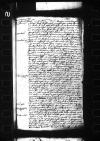Pro veteri illa nostra in aula ⌊s(acratissimae) caesareae maiestatis⌋ coniunctione et ea benevolentia, qua me semper humanissime prosequebatur Magnificentia Vestra, in ea persevero fiducia, quod illam animi sui in me propensionem et candorem on the margin⌈et candoremet candorem on the margin⌉ neque temporis diuturnitas aut tanta locorum intercapedo diminuere, vel in superinscribed in place of crossed-out quo⌈quoinin superinscribed in place of crossed-out quo⌉ conservandis amicitiis Magnificentiae Vestrae constantia immutare quicquam potuerit. Qua in re factus audentior, ⌊hunc cubicularium on the margin⌈cubiculariumcubicularium on the margin⌉⌋ cum on the margin⌈cumcum on the margin⌉ ⌊serenissimi regis mei on the margin⌈meimei on the margin⌉⌋ litteris et negotiis Magnificentiae Vestrae commendandum operae pretium esse censui, utpote et superinscribed⌈etet superinscribed⌉ quae magnae apud ⌊caesaream maiestatem⌋ auctoritatis est, et quae suapte natura ad provehendum res iustas reiquae Christianae apprime necessarias facile inclinatur. Non est Magnificentiae Vestrae incognitum, quibus modis ⌊iudicium camerae imperialis⌋ contra nepotem ex ⌊sorore⌋ ⌊serenissimi regis mei⌋ et subiectum regni eius principem, illustrissimum dominum ⌊Albertum marchionem Brandenburgensem et ducem in Prussia⌋, bannum emiserit, quod ⌊serenissima caesarea maiestas⌋, cum ⌊Ratisponae⌋ essemus, ad decursum duorum annorum suspendit, unde cum hoc tempus brevi iam exspirare videtur, ne inde graviores turbae aut fortassis apertum et ⌊reipublicae Christianae⌋, quae iam superinscribed⌈iamiam superinscribed⌉ tumultibus plena est ubique bellum, perniciosum bellum accenderetur, ⌊serenissimus rex meus⌋ pro senili et vere regia sua prudentia ⌊serenissimae caesareae maiestati⌋ cum hoc cubiculario scribendum duxit, quarum litterarum ut Magnificentia Vestra benigna sit velit esse interpres habita istius adeo periculosi temporis ratione, summopere rogo, quo vel iterum negotium hoc exsecutionis banni quam diutissime suspenderetur, vel e medio, si fieri posset, cum ⌊camerae imperiali⌋ nihil in ⌊subditos⌋ ⌊serenissimi regis mei⌋ iuris competit, penitus tolleretur.
Quod nisi obtineatur, fieri non potest, quin etiam hic in nostro angulo omnia superinscribed⌈omniaomnia superinscribed⌉, quemadmodum fere iam superinscribed⌈iamiam superinscribed⌉ per totum ⌊Christianum orbem⌋ in turbas et gravissimam tragoediam omnia exundent et non sine magna aeris et (quod omen Deus procul absit superinscribed in place of crossed-out avertat⌈avertatabsitabsit superinscribed in place of crossed-out avertat⌉) sanguinis Christiani profusione transigantur. Quod ut Magnificentia Vestra pro sua auctoritate et in rebus summa perspicientia, quantum potest on the margin⌈quantum potestquantum potest on the margin⌉, avertat, oro atque obtestor, a Deo Omnipotenti aeternum praemium et ab hominibus meritam gratitudinem et laudem non vulgarem on the margin⌈non vulgaremnon vulgarem on the margin⌉ habitura amplissimam meque sibi Magnificentia Vestra, qui pro officio ordinis mei ecclesiastici eti pro conservanda tranquillitate publica nihil aliud quam pacem a Deo peto, reddet sibi Magnificentia Vestra on the margin⌈sibi Magnificentia Vestrasibi Magnificentia Vestra on the margin⌉ devinctissimum. Cuius me benevolentiae ex animo commendo Deumque precor, ut Magnificentiam Vestram quam diutissime sospitet et prosperet in omnibus. ⌊Petrum olim dispensatorem meum⌋, qui mihi fidelissime inservivit, ut gratia sua Magnificentia Vestra prosequatur, plurimum rogo. Virtus et fides eius digna est, ut a Magnificentia Vestra commendata habeatur.

 AAWO, AB, D. 67, f. 292r
AAWO, AB, D. 67, f. 292r